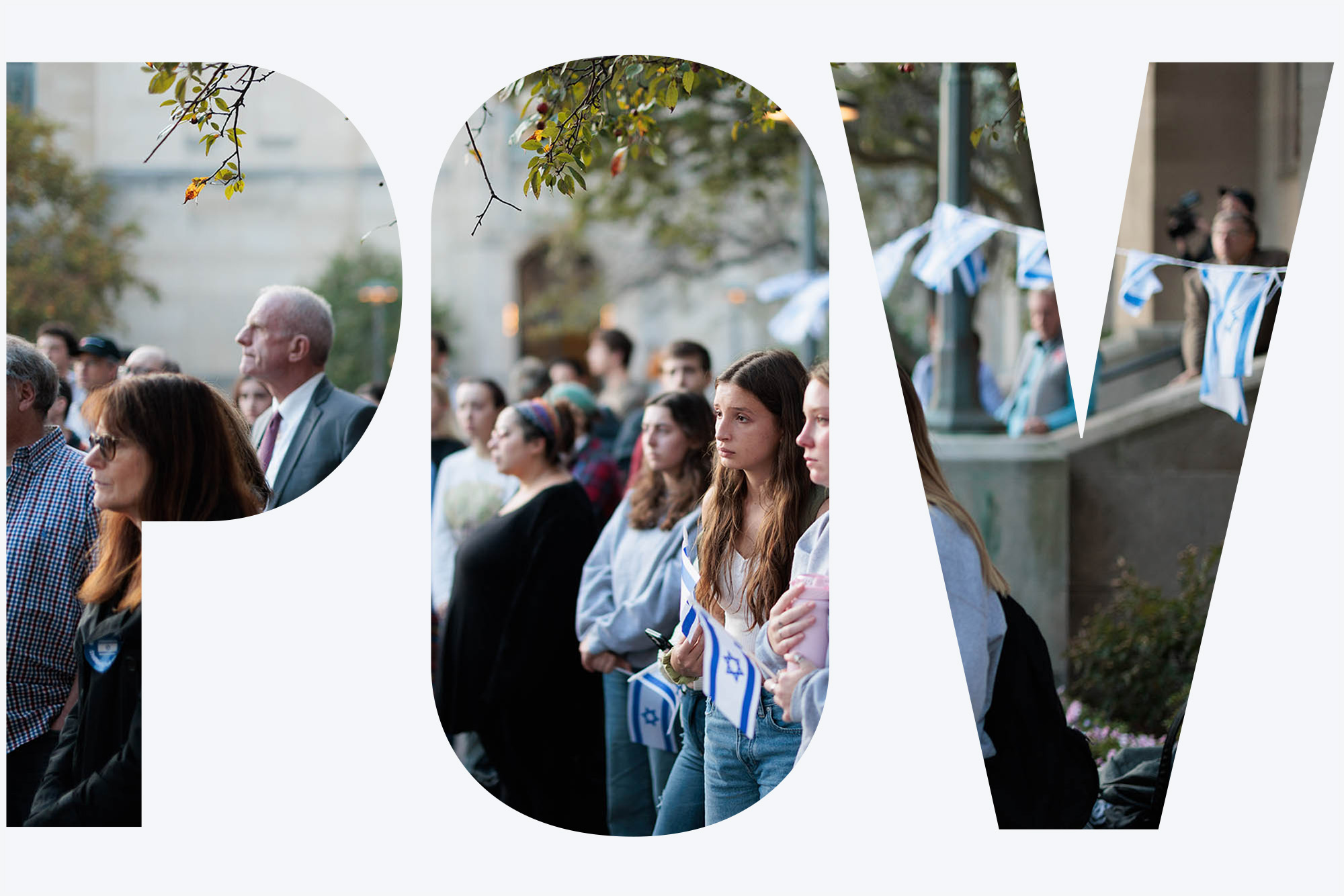POV: When It Comes to Talking about Israel and Hamas, We Need to Take the Conversation Offline
The solution lies in direct, face-to-face informed dialogues

POV: When It Comes to Talking about Israel and Hamas, We Need to Take the Conversation Offline
The solution lies in direct, face-to-face informed dialogues
Fervent conversations taking place at universities across the country surrounding the Israel-Hamas war highlight the depth of engagement students have with global affairs. A doxing attack at Harvard, where a student group displayed the names and faces of another group, labeling them as “anti-semites,” and another incident last weekend where a UMass student punched a classmate and spit on the Israeli flag serve as a stark reminder of the intensity of these discussions. Such incidents beg the question: in our age of hyper-connectivity, how do we ensure that our perspectives on sensitive and multifaceted topics, like the Israel-Hamas war, aren’t shaped by online echo chambers, but instead by informed and respectful dialogues? As a Boston University student studying technology, who has ceaselessly scrolled through social media reposts from polarized individuals, I propose that we take the conversation offline.
Misinformation and disinformation, inevitable by-products of our digital age, often complicate this mission. Recent developments in X (the social media platform formerly known as Twitter) encourage perpetuating false narratives. The blue “verified” check status can now be bought via a subscription plan and doesn’t mean the person is who they claim to be. Previously, the blue check mark was proof of authenticated users. The news rating company NewsGuard recently determined that 74 percent of accounts that promoted misinformation on the Israel-Hamas war on X were verified accounts, and that those posts had gathered approximately 100 million views a week, globally. This underscores the fact that while the internet makes information accessible, not all of it is trustworthy.
When addressing global subjects such as the Israel-Hamas war, we must ensure skewed agendas don’t shape our understanding. Recent research from the Pew Research Center found that Americans who predominantly get their news from social media platforms tend to be both less engaged and less politically knowledgeable. These platforms, which often prioritize catchy headlines over substantive content, can inadvertently promote and spread unverified and click-bait-like claims. Given this context, one must critically evaluate sources and rely on trustworthy resources. Engaging with accurate information isn’t just a good practice—it’s essential for promoting insightful, informed discussions in our diverse community.
Another challenge of social media, a result of the very design of these apps, is the echo chamber. Designed to serve users content aligned with their existing beliefs and interests to raise user engagement, these platforms deliberately trap users in perpetual feedback loops. The act of merely resharing posts or infographics, especially on platforms like Instagram, might give the illusion of engagement, but frequently lack the depth required for true understanding. If we let these platforms dictate our worldview, we risk becoming passive consumers of a singular narrative, devoid of the broader context and holistic worldview.
So, how do we escape this digital rabbit hole? The solution lies in direct, informed dialogues. While online discussions have their merits, nothing replaces the value of face-to-face interactions, as difficult as those interactions might be. Campuses should be epicenters of these genuine conversations. At institutions like Boston University, the potential for bridging divides through dialogue is enormous. Here are some ideas BU could implement:
By actively integrating these initiatives, BU could help move our community toward a more enlightened and empathetic understanding of global events.
To be sure, social media platforms have the power to amplify voices and catalyze change. Social movements like Black Lives Matter and #MeToo gained momentum online and benefited from the global visibility and rapid distribution of information. Social media helps raise awareness and spread information, but students should not think of it as the only form of communication and activism. It can serve as a good starting point, with its ease of access and use, but it’s certainly not the end. Deeper conversations leveraging in-person meetings, personal anecdotes, and respectful language will allow for a constructive and meaningful dialogue on college campuses.
While social media platforms provide one space for global conversations, it’s crucial to recognize their limitations, and their flaws. To genuinely understand and address sensitive topics like the Israel-Hamas war, we must strive for in-depth, informed, and empathetic interactions beyond the screen. After all, conversations flow better if you have more than 280 characters to speak.
Hailey Moon (CAS’24) is a student at Boston University, focusing on technology, innovation, and community. She is a codirector of BostonHacks, one of the biggest hackathons in the Northeast, and is passionate about fostering a diverse, interconnected community in technology. She can be reached at hmoon@bu.edu.
“POV” is an opinion page that provides timely commentaries from students, faculty, and staff on a variety of issues: on-campus, local, state, national, or international. Anyone interested in submitting a piece, which should be about 700 words long, should contact John O’Rourke at orourkej@bu.edu. BU Today reserves the right to reject or edit submissions. The views expressed are solely those of the author and are not intended to represent the views of Boston University.
Comments & Discussion
Boston University moderates comments to facilitate an informed, substantive, civil conversation. Abusive, profane, self-promotional, misleading, incoherent or off-topic comments will be rejected. Moderators are staffed during regular business hours (EST) and can only accept comments written in English. Statistics or facts must include a citation or a link to the citation.